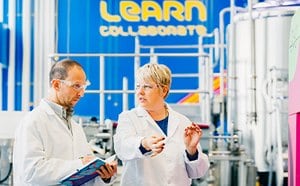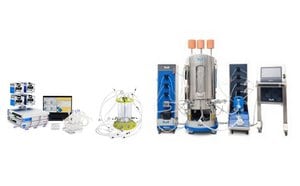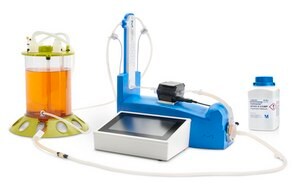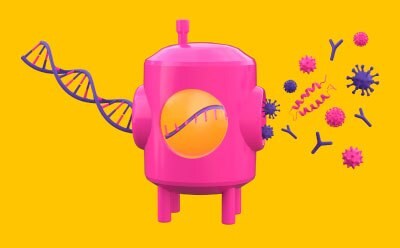Cell Culture Solutions for Biopharma Manufacturing
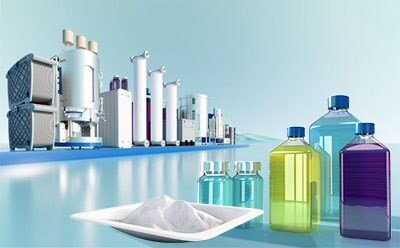
Cell culture is at the heart of biopharmaceutical manufacturing, enabling the production of therapeutic products across modalities. Making the right choices early in development is critical for successful scale-up to production.
Key cell culture challenges you may face in your manufacturing process include:
- Speed to Market: How quickly your drug product can reach the market is determined by cell line performance, achievable titer and protein quality attributes, as well as process intensification and scalability.
- Process Economics: A robust process with consistent high output, optimized factory utilization and reduced footprint enhance process efficiency and increase your productivity
- Quality and Risk Mitigation: Ensuring the integrity of raw materials is essential for achieving a high-quality final product. Comprehensive raw material characterization, supply chain qualification, and process analytical technologies enhance control.
- Business Continuity: Speed, economics, quality, and risk mitigation—along with a reliable supply of cell culture solutions—are essential for preventing manufacturing disruptions and ensuring product quality and safety.
Explore this page to discover how you can elevate your cell culture manufacturing!
Featured Categories
Our off-the-shelf and customizable bioprocessing cell culture media (CCM) products...
The Mobius® Bioreactor family offers single-use bioreactors for cell culturing from early...
Enhance perfused seed train efficiency with our cell retention solution. Real-time monitoring and control.
Streamline cell line development with our off-the-shelf systems. Cut time, cost, & risks in producing antibodies, proteins, viral vaccines & gene therapies.
By understanding your options in cell culture manufacturing, you’ll be empowered to make informed decisions to enhance process reliability and ensure the quality of your biopharmaceutical products. Comprehensive end-to-end solutions and a strong partner you can trust help streamline your path to market
Elevate Your Cell Culture Manufacturing
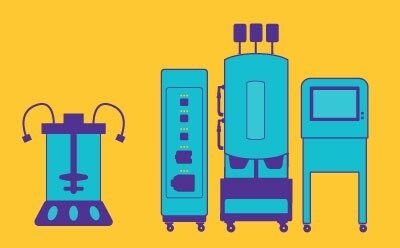
Enhance mAb Upstream Efficiency with Process Intensification
By adopting intensified fed-batch and perfusion processes, biopharmaceutical manufacturers can enhance efficiency, ensure high-quality output, and accelerate speed to market.
- Explore comprehensive solutions to increase productivity and intensify upstream processing in mAb manufacturing.
- Learn about perfusion-specific cell line development and cell clones to streamline your intensified processing.
- Intensify seed train expansion with high cell density cryopreservation.
- Discover how the selection of an appropriate cell retention technology impacts process economics.

Boost Productivity with the Right Media and Feeding Strategy
Selecting the right media and feeding strategy, along with ensuring high quality of cell culture media and feeds, is crucial for achieving consistent results and high-quality product output (in cell culture). Success relies on a robust supply chain, effective quality management practices implemented by the supplier, and their expertise in media composition and formulation.
- Explore our comprehensive portfolio of fit-for-purpose solutions for CHO, HEK293, insect cell lines.
- Satisfy the nutritional needs of your cell culture with recombinant supplements, enzymes, and growth factors.
- Reduce media contamination risk with appropriate filtration solutions.
- mAb-specific: Find here selecting CHO media and feeds for traditional, intensified fed-batch and perfusion applications.
- mAb-specific: Implement a tailored feeding strategy to fine-tune protein quality attributes, such as glycosylation, and enhance therapeutic outcomes.

Custom Manufacturing and Services for Cell Culture
Utilizing custom solutions and tailored service support can significantly improve operational efficiency and product/process? outcomes. It allows you to benefit from external expertise, taking some of the weight off your shoulders and allowing you to focus on your process and product.
- Custom manufacturing of cell culture media, feeds, supplements, buffers, and concentrates supports optimal cell culture performance.
- Custom media development services identify and create tailored solutions that meet your exact needs.
- Cell culture media stability and testing services provide information on media and other components’ shelf life as well as nutritional analysis data.
- Learn how cell culture media fingerprinting enables unparalleled accuracy and efficiency through the simultaneous quantitation of 100+ media components.
- mAb-specific: CHOZN® Cell line engineering and development services support you through rapid development of high-performing cell lines.

Role of Quality Management and Risk Mitigation in Upstream Processes
A robust quality management system is crucial for maintaining high safety, consistent quality and reliable performance. By collaborating with us as a trusted supplier that has implemented a robust quality management system and risk mitigation measures, manufacturers can safeguard their production process and ensure compliance while minimizing efforts on their side.
- Explore our global quality management system, raw material and vendor management program for cell culture solutions.
- Learn about the first GMP Guideline for Cell Culture Media, a standard implemented at all our cell culture media manufacturing sites.
- Our Emprove® Program provides comprehensive technical, regulatory, and supply documentation to support your risk assessment efforts.
- Minimize variability in cell culture performance by understanding the impact of trace element impurities.

Improve Process Understanding and Control in Cell Culture
Achieving consistent results in cell culture manufacturing requires a deep understanding of the underlying processes. A proactive approach enables manufacturers to make informed adjustments during production, enhancing efficiency and ensuring product quality. By leveraging data-driven insights, organizations can optimize their processes and maintain compliance with industry standards.
- Discover how the implementation of Process Analytical Technologies (PAT) improves process efficiency and control.
- Explore sampling strategies and compare available technologies for reliable process insights.
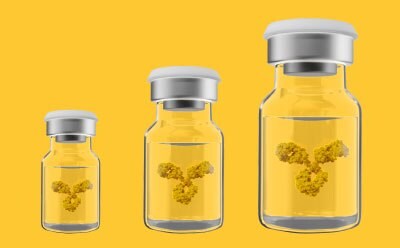
Navigate Scale-Up Challenges in Cell Culture Manufacturing
Transitioning from small-scale to large-scale production, or scaling down for process optimization, presents unique challenges (that can impact efficiency and product quality). Understanding the factors influencing cell growth and productivity at different scales, along with selecting flexible, scalable options, is crucial for successful process development and smooth transfer to production scale.
- Find out more about bioreactor scalability and performance .
- Learn how reliable scale-down models can accelerate process development.
- Explore imMEDIAte ADVANTAGE® services services for pre-GMP small-scale custom cell culture solutions, supporting your development with a quick turnaround.
- Viral vector-specific: Learn about scalability challenges in AAV manufacturing and discover available solutions.

Importance of Regional Supply and Supply Chain Transparency
Successful, consistent operations start with reliable supply. A trusted supplier that supports global manufacturing needs with high-quality solutions and is efficient at a regional level is the foundation for a robust production process.
- Explore how building regional cell culture media supply chains backed by a global quality management system, ensuring consistent quality and reliable supply.
- Discover our new South Korean manufacturing facility for improved in-region for-region supply to the Asia-Pacific region.
- Learn about the first GMP Guideline for Cell Culture Media, a standard implemented at all our cell culture media manufacturing sites.
Related Articles
- Cell culture media are vital for bioprocessing therapeutics. This page describes the central role of our organization in authoring purpose-built GMP for cell culture media.
- Ensure reliable cell culture media supply with our continuously expanding global network of regional sites for resilient biopharma manufacturing.
- Learn about rapid and cost-effective identification of more than 100 media formulation components using LC-MS cell culture media fingerprinting.
- Cellvento® and EX-CELL® CHO cell culture media and feeds, optimized for monoclonal antibody & recombinant protein production in fed-batch & perfusion
- Enhance mAb and recombinant protein performance, efficacy, and stability with precise glycosylation modulation using the Cellvento® ModiFeed platform.
- See All (26)
Find More Articles and Protocols
How Can We Help
To get in touch with our cell culture specialists and discuss how we can support your goals, please Request Information on our Cell Culture Solutions and Services
If you are specifically interested in viral vector solutions, please viral vector production contact form.
A technical expert will be in touch with you shortly.
Additional Support
Find more information on our products and services for monoclonal antibody manufacturing.
Explore our end-to-end solutions for gene therapy manufacturing.
To continue reading please sign in or create an account.
Don't Have An Account?